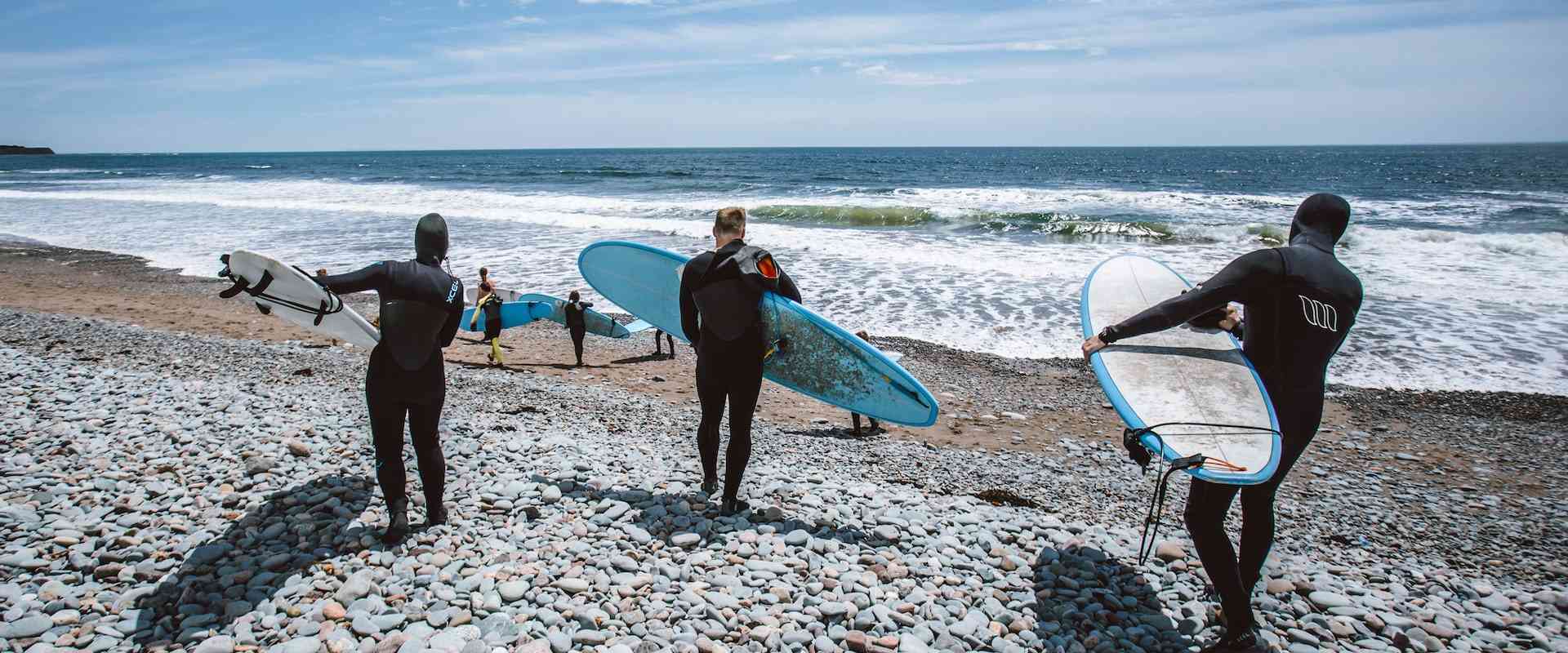Learn / Learning Self-Care at Orange County Rehabs
Learning Self-Care at Orange County Rehabs


September 23rd, 2021| Clinically Reviewed by
Key Points
- OC rehabs offer outdoor activities, beautiful scenery, and perfect weather.
- Experiential therapies here include whale watching, go karting, and surfing.
- These centers focus on individualized treatment, dual diagnosis care, and life skills.
Nestled between the Pacific coast and the Santa Ana Mountains, Orange County is a gorgeous place to attend rehab. Thanks to its near-perfect weather, visitors can enjoy outdoor activities year-round. The area boasts numerous beaches—like the famous Laguna Beach—and public parks. Orange County is an especially popular destination for surfers, and even hosted the World Surf League finals in 2021.
Coastal living certainly isn’t for everyone. If you prefer indoor activities, or if you find comfort in colder weather, a rehab center in Orange County might not be a good fit. This is an excellent destination for people who enjoy temperate weather, beach excursions, and time in the great outdoors.
Outdoor Adventures at Orange County Rehabs
Talk therapy is hard work, especially for people in recovery. Many rehab programs balance this with experiential therapy, in which clients use a different set of tools to process their emotions. These modalities are not only fun; they’re also an important part of healing. On these guided excursions, clients can practice the skills they’ve learned so far by navigating new situations, relating to a group, and sometimes even overcoming physical challenges.
Many experiential therapy programs focus on athletic activities, like rock climbing. In Orange County, however, clients can participate in outdoor adventures that don’t necessarily depend on physical fitness. Many of these are unique to the area, and would be difficult to access in another climate.
Whale Watching
Whale watching is a beautiful way to spend time outside, whether or not you enjoy athletics. Residents at Monarch Shores, for example, are invited to go on these day trips. If you choose to participate, you’ll take a boat ride near the California coast, with the potential to see some of the most beautiful and majestic creatures in the natural world. These guided tours are carefully planned to maximize your chance of seeing whales, although there’s no way to predict whether they’ll be visible at the exact time you’re passing by.
Whale watching isn’t physically taxing—unless you’re prone to motion sickness. Participants can just enjoy the ride, take in the scenery, and talk to each other throughout the trip. This activity is ideal for clients who love the outdoors, but want to be more focused on emotional healing than on physical challenges. As with any type of experiential therapy, you’ll be supported by the staff of your program throughout the trip.
Go Karting
Go karting is a popular sport in Orange County, and is accessible year-round due to the local climate. Clients may be invited to drive on an outdoor or indoor course, depending on their specific program. This experience is offered by a few Orange County rehabs, like Monarch Shores.
This increasingly popular sport can be competitive, but it doesn’t have to be. Depending on which rehab you attend, you might go either to a racetrack or a driving course. This is a way for clients to learn about group dynamics, and to practice healthy risk-taking. People in recovery may be accustomed to the thrill of dangerous situations. Go karting teaches you that it’s possible to feel that thrill without actually putting yourself in grave danger. You’ll learn how to keep yourself safe, while simultaneously meeting your need for adventure.
Go karting is popular in Orange County and around the world. If you realize you love it, you can likely continue this hobby even after you finish rehab, whether or not you live in the immediate area.
Surfing
The beach is easily accessible throughout Orange County. If you choose a rehab in this area, you’ll almost certainly be invited to visit the coast. Several programs in the area take advantage of this with water activities like surfing.
Even more than most sports, surfing is a fully embodied experience. It has great physical health benefits, and may also help clients improve their body awareness. This can be especially important while you learn or re-learn how to meet your own physical and emotional needs. Research has even found that surfing can offer clients “a sense of respite from PTSD.”2 This is a common concern for people in recovery, who are often healing from dual diagnoses.
Dual Diagnosis Treatment in Orange County
Most luxury rehab facilities in Orange County offer dual diagnosis treatment. This philosophy honors the needs of clients with more than one mental health issue, such as a substance use disorder combined with PTSD, or an eating disorder combined with OCD. Every client’s experience is unique, and this approach allows providers to offer you the care that best suits your unique needs.
Dual diagnosis treatment is designed to “help patients return to a life of normalcy as they learn to address their co-occurring disorder properly.3 The goal of dual diagnosis treatment centers is to provide patients with the tools and resources needed to successfully cope with their mental illnesses without the use of drugs and alcohol.” This approach does not aim to “fix” you, or to get your mental illness to go away. Instead, the focus is on sustainability. Clients learn to live with their ongoing conditions, using a variety of therapies to manage their symptoms. If you have, or are concerned that you may have, more than one relevant diagnosis, this treatment is likely to be a good fit.
Learning to manage your mental health is an absolutely essential component of addiction recovery. When you find sustainable, repeatable strategies for dealing with triggers and other hardships, you’ll be better equipped to continue healing after residential treatment. Some people find it helpful to think of mental illness just like any other chronic condition. If you have fibromyalgia, for example, you might have to adjust your work schedule, or take certain medications to manage your symptoms. The same is true for emotional issues.
It’s quite common for clients to have dual diagnoses. Alex Spritzer, Family Addiction and Psychiatric Nurse Practitioner at The Hope House Scottsdale, explains that “it’s not often that you’ll find someone with a singular addiction…In the dual diagnosis process, figuring out the reasons why people use is very important.” If this describes you, know that you aren’t alone. Trained healthcare providers will work with you to manage your condition, using tools such as talk therapy, medication, and specific plans for aftercare. Dual diagnosis treatment recognizes that each client is a complex, unique individual. You can trust that your treatment plan will be tailored to best suit your needs.
Explore Orange County Treatment Centers
Individualized Treatment in Orange County
Many people attend rehab in Orange County because they’re seeking highly individualized care. Thanks to the richly diverse culture of this coastal area, practitioners understand that every client’s needs are unique. Treatment is focused on helping you achieve your personal goals for recovery, using the therapeutic modalities that you and your team agree are most effective. In some cases, the process of personalizing treatment begins before you arrive at rehab, or before you even begin to detox.
At Capo By The Sea, for example, clients undergo a thorough intake assessment as part of the admission process. This practice “allows the intake clinicians to accurately diagnose the disease and identify any unique features involved. From the information provided during the intake interview and evaluation, an individualized treatment plan is created as a kind of recovery blueprint, customized to address the specific needs and recovery goals of the individual.”
In service of their philosophy, this rehab center offers amenities that are hard to find elsewhere. Their executive treatment program supports clients who may need to work during residential rehab, with efficient scheduling and the freedom to use electronic devices. They even provide pet-friendly housing options.

When you attend this type of bespoke rehab program, your providers account for your pre-existing strengths, and help you identify areas of growth. Treatment is designed to help you learn exactly the skills you need, developing healthy strategies for your continued recovery.
Orange County’s Commitment to Education
Many cultural stereotypes envision people with substance use disorders as being destitute, low-income, and uneducated. This is simply not the case. Research has shown that this disease can impact people from all walks of life. The perception that high achievers are immune to addiction is extremely damaging; it perpetuates isolation and shame, preventing many people from seeking help. All people are deserving of care, including all people with substance use disorders. And you are not alone.
The rates of substance misuse among well-educated people are particularly illuminating. One study reported high rates of both licit and illicit substance use among well-educated respondents:4 “42% reported using mood-altering prescription drugs (analgesics, antidepressants, sedatives, or tranquilizers).” Although these numbers reflect rates of use, and not necessarily rates of addiction, they do paint a concerning picture. Based on these and other findings, researchers concluded that “prevention and early intervention programs need to address use of mood-altering substances (including alcohol) in highly educated workforces.”
Orange County has a highly educated population,5 and is home to many universities, including Pepperdine University, Chapman University, and UC Irvine. It’s clear that this area has a strong cultural focus on learning. As a result, many Orange County rehab centers place an emphasis on teaching their clients important life skills.
The Ho Tai Way, in Costa Mesa, is a treatment program specifically for women. In addition to detox and regular therapy, clients attend classes designed to prepare them for life after rehab. They learn skills such as finance management, healthy cooking, and how to keep up with basic daily routines. They’re also supported in determining their career goals, and planning ways to enact those goals after leaving treatment.
This program is based on the idea that these skills form the basis of a healthy and meaningful life. “When you know how to cook a meal, stay on top of your finances, and establish healthy habits–you have a foundation for dealing with other life issues that come your way. The basics have been taken care of, so you can direct your attention to other challenges in your life as they come.”
This emphasis on learning sets clients up for success in more ways than one. First, you’ll leave rehab with practical skills that will help you build healthy daily habits. Second, you’ll be better-equipped to learn even more about yourself as you begin the next chapter of your life. Learning, like recovery, is a life-long process. Any education program—be it a high school, a university, or a series of classes offered in treatment—teaches you not only to understand the subject matter, but also how to approach the actual process of learning. By honing this skill, clients can maintain a healthy level of curiosity about themselves and their lives. This may support you in trying new things, building relationships, and creating a healthier lifestyle after rehab.
When you first begin rehab, it’s quite common to feel lost or even helpless. It’s all too easy to lose hope. By learning how to meet your own needs in a safe, protected environment, you can develop a new sense of agency. As you learn to trust yourself again, you may become more confident in your ability to navigate life after rehab.
Getting to Orange County
Although Orange County is a populous area, it’s not quite a major travel hub like neighboring Los Angeles. John Wayne Airport, the county’s one major airport, is centrally located, making it easy to reach most of the rehabs in the area by car. Most facilities offer their clients ground transportation from the airport. If you’re flying into Orange County for treatment, make sure to talk to your admissions team about your travel plans.
Immediately after rehab, many clients benefit from transitional programs before they return to the hustle and bustle of life at home. If you enjoy your time in Orange County, you may be able to stay in the area after your initial stay in a residential facility. Capo By The Sea, for example, has a sober living environment for clients who have completed inpatient treatment. This option can be a good fit for people who want on-site support while they practice new skills. It can also help you continue to learn more about your own specific needs, and plan ways to meet them in the future.
Learning How to Heal
Every recovery process is unique, because every person is unique. Orange County rehabs balance this idea with the understanding that we all share certain needs. These facilities help their clients form a strong foundation from which to build healthy, happy, sustainable lives.
This approach isn’t right for everyone. You may benefit from a much more structured rehab program, where you can connect with members of your cohort about a shared treatment regimen. Alternatively, you may need even more flexibility, and prefer to attend a one-person rehab facility where you have even more say in how you approach recovery.
The process of choosing a program is one of the first steps in getting reacquainted with yourself. As you enter the next phase of recovery, you can expect to learn even more about your own values, needs, and goals. Whether or not you attend rehab in Orange County, it’s important to think about your own learning style while selecting a program. If you think you would benefit from individualized treatment in a coastal setting, with a strong focus on life skills, this area might be a good fit for you.
Learn more about luxury rehabs in Orange County.
Frequently Asked Questions About Orange County Rehabs
What types of outdoor activities can I expect at Orange County rehabs?
Orange County rehabs offer a range of outdoor activities to enhance the recovery process. From whale watching trips to go karting and surfing, these experiential therapies provide clients with unique opportunities for personal growth and emotional healing.
Do Orange County rehabs offer dual diagnosis treatment for co-occurring mental health disorders?
Yes, most luxury rehab facilities in Orange County provide dual diagnosis treatment. This specialized approach addresses substance use disorders combined with mental health conditions. These programs focus on helping clients develop sustainable strategies to manage mental illness without relying on drugs or alcohol.
How do Orange County rehabs personalize treatment plans for clients?
Orange County rehabs prioritize individualized care and tailor treatment plans to meet each client’s unique needs and recovery goals. Through comprehensive assessments, rehabs here create personalized recovery blueprints for clients, considering their pre-existing strengths and areas of growth.
-
Baker, Brendan. “Go Kart History in North America.” Engine Builder Magazine, 4 May 2021, https://www.enginebuildermag.com/2021/05/go-kart-history-in-north-america/.
-
Caddick, N., Smith, B., & Phoenix, C. (2015). The effects of surfing and the natural environment on the well-being of combat veterans. Qualitative Health Research, 25(1), 76–86. https://doi.org/10.1177/1049732314549477
-
“Dual Diagnosis Treatment Centers in California | Inpatient Drug Rehab.” Monarch Shores, https://www.monarchshores.com/treatment/dual-diagnosis-rehab/. Accessed 5 June 2023.
-
https://www.researchgate.net/publication/11519946_Prevalence_of_Alcohol_and_drug_use_in_a_highly_educated_workforce
-
U. S. Census bureau quickfacts: Orange county, california. (n.d.). Retrieved September 21, 2021, from https://www.census.gov/quickfacts/fact/table/orangecountycalifornia/PST045219
Return to Resource Library
Our Promise
How Is RehabPath Different?
We believe everyone deserves access to accurate, unbiased information about mental health and addiction. That’s why we have a comprehensive set of treatment providers and don't charge for inclusion. Any center that meets our criteria can list for free. We do not and have never accepted fees for referring someone to a particular center. Providers who advertise with us must be verified by our Research Team and we clearly mark their status as advertisers.


















